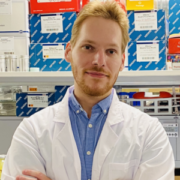Treating Pancreatic Cancer: Could Metabolism—Not Genomics—Be the Key?

Thomas Seyfried
Biology Department
science

Derek Lee, MS
PhD Candidate (Seyfried Lab), Department of Biology at Boston College

Tomás Duraj, MD, PhD
Postdoctoral Research Fellow, Department of Biology at Boston College

Curious Dr. George
Cancer Commons Editor in Chief George Lundberg, MD, is the face and curator of this invitation-only column
In 2018, we published a Curious Dr. George post featuring Thomas N. Seyfried, PhD, about cancer possibly being mostly a metabolic—rather than genetic—disease. Since then, the field of cancer genomics has expanded enormously, and we have published many posts in support of better understanding and treatment of many types of cancer based on the genomic approach. Here, Dr. Seyfried and two of his colleagues at Boston College—Derek Lee, MS, and Tomás Duraj, MD, PhD—provide an update on their perspective.
Curious Dr. George: Our recent Curious Dr. George post on pancreatic cancer stimulated you to push back on existing therapeutic strategies that have been failures for so long, and suggest an entirely different approach. Why do the current treatments of pancreatic cancer fail, and what new approach might be worth considering?
Thomas N. Seyfried, PhD; Derek Lee, MS; and Tomás Duraj, MD, PhD: Current therapeutic approaches for managing the most common form of pancreatic cancer (pancreatic ductal adenocarcinoma , or PDAC)—and many other cancers, for that matter—have failed to significantly reduce deaths in severe cases. The promise of effective precision medicine based on the somatic mutation theory of cancer has not been realized. This is evident from the latest statistics published by the American Cancer Society showing that, every day, almost 1,700 people die of cancer or cancer-treatment-related causes. While it is understandable and important to highlight recent advancements, the long-term (10-year) survival rate for PDAC is still less than 5%.
It is also important to be realistic about the side effects of many first-line treatments for PDAC. Many of the current “targeted” treatments can result in severe fatigue, gastrointestinal disturbances, liver failure, and myriad other complications. These adverse effects are unacceptable and contribute further to the physical and mental stress already associated with a cancer diagnosis. Treatment modalities based on an incorrect theory of cancer origin will not provide optimal management for most patients.
In contrast to the somatic mutation theory, the mitochondrial metabolic theory can better explain the origin of cancer and provide more rational therapeutic strategies for management. For example, KRAS mutations negatively impact oxidative phosphorylation (OxPhos), thus forcing tumors to be more dependent on aerobic fermentation than on OxPhos for driving dysregulated growth. OxPhos inefficiency coupled to energy synthesis through aerobic glucose and glutamine-dependent fermentation is now recognized in nearly all cancers. Unfortunately, the metabolic dependencies of cancer cells are just an afterthought, if considered at all.
We have yet to find a report showing any cancer cells that can grow in the absence of glucose and glutamine. Ketone bodies and fatty acids are non-fermentable fuels and cannot therefore replace either glucose or glutamine for sufficient energy production in cancer cells with OxPhos insufficiency. An effective non-toxic therapeutic strategy for managing cancer would therefore involve the simultaneous down-regulation of the glucose-driven glycolysis and the glutamine-driven glutaminolysis pathways using diet-drug combinations, while transitioning the body to non-fermentable fuels, e.g., fatty acids and ketone bodies.
A transition of the body from glucose to nutritional ketosis—glucose/ketone index (GKI) values of 2.0 or below—will induce significant physiological stress on the already metabolically inflexible cancer cells while, at the same time, providing an efficient energy source for healthy cells that evolved to transition from glucose to ketone bodies under dietary energy reduction. A combination of both carbohydrate restriction and high-intensity exercise will stimulate glucose and glutamine clearance from circulation.
Adherence to this approach can be challenging for some, but shifting the role of the patient from passive observer to active participant in their non-toxic metabolic treatment strategy will help enable longer-term management of their cancer.
Dr. Seyfried can be reached at thomas.seyfried@bc.edu, Dr. Lee at leebig@bc.edu, and Dr. Duraj at tomas.duraj@bc.edu.
Additional references for successful application of ketogenic metabolic therapy in animals and humans:
İyikesici MS, Slocum AK, Slocum A, Berkarda FB, Kalamian M, Seyfried TN.Efficacy of Metabolically Supported Chemotherapy Combined with Ketogenic Diet, Hyperthermia, and Hyperbaric Oxygen Therapy for Stage IV Triple-Negative Breast Cancer. Cureus. 2017 Jul 7;9(7):e1445. doi: 10.7759/cureus.1445.
Elsakka AMA, Bary MA, Abdelzaher E, Elnaggar M, Kalamian M, Mukherjee P, Seyfried TN. Management of Glioblastoma Multiforme in a Patient Treated With Ketogenic Metabolic Therapy and Modified Standard of Care: A 24-Month Follow-Up. Front Nutr. 2018 Mar 29;5:20. doi: 10.3389/fnut.2018.00020.
Augur ZM, Doyle CM, Li M, Mukherjee P, Seyfried TN. Nontoxic Targeting of Energy Metabolism in Preclinical VM-M3 Experimental Glioblastoma. Front Nutr. 2018 Oct 5;5:91. doi: 10.3389/fnut.2018.00091. eCollection 2018.
Mukherjee P, Augur ZM, Li M, Hill C, Greenwood B, Domin MA, Kondakci G, Narain NR, Kiebish MA, Bronson RT, Arismendi-Morillo G, Chinopoulos C, Seyfried TN. Therapeutic benefit of combining calorie-restricted ketogenic diet and glutamine targeting in late-stage experimental glioblastoma. Communications Biol. 2019 May 29;2:200. doi: 10.1038/s42003-019-0455-x.
Seyfried TN, Shelton L, Arismendi-Morillo G, Kalamian M, Elsakka A, Maroon J, Mukherjee P. Provocative Question: Should Ketogenic Metabolic Therapy Become the Standard of Care for Glioblastoma? Neurochem. Res. 2019 Apr 25. doi: 10.1007/s11064-019-02795-4.
Seyfried TN, Mukherjee P, Iyikesici MS, Slocum A, Kalamian M, Spinosa JP, Chinopoulos C. Consideration of Ketogenic Metabolic Therapy as a Complementary or Alternative Approach for Managing Breast Cancer. Front Nutr. 2020 Mar 11;7:21. doi: 10.3389/fnut.2020.00021.
İyikesici MS, Slocum AK, Winters N, Kalamian M, Seyfried TN. Metabolically Supported Chemotherapy for Managing End-Stage Breast Cancer: A Complete and Durable Response. Cureus. 2021 Apr 26;13(4):e14686. doi: 10.7759/cureus.14686.PMID: 33927959.
Seyfried TN, Shivane AG, Kalamian M, Maroon JC, Mukherjee P, Zuccoli G. Ketogenic Metabolic Therapy, Without Chemo or Radiation, for the Long-Term Management of IDH1-Mutant Glioblastoma: An 80-Month Follow-Up Case Report. Front Nutr. 2021 May 31;8:682243. doi:10.3389/fnut.2021.682243. eCollection 2021.PMID: 34136522.
Seyfried TN. The effects of diet on prostate cancer outcomes. Nat Rev Urol. 2022 Jul;19(7):389-390. doi: 10.1038/s41585-022-00612-2.PMID: 35676538.
***
Copyright: This is an open-access article distributed under the terms of the Creative Commons Attribution License, which permits unrestricted use, distribution, and reproduction in any medium, provided the original author and source are credited.


